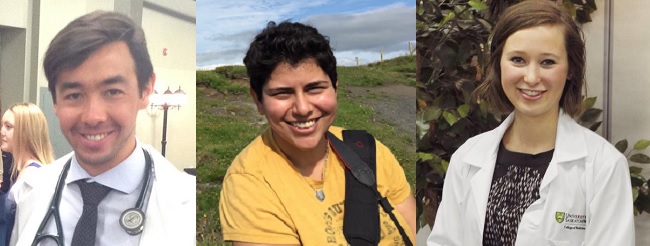
Incoming class brings wealth of experience
From software engineering to research in antibiotic resistance, the latest UGME class has a variety of experience to draw from.
By Marg SheridanPart of the charm of the College of Medicine is that as each new class of students enter the undergraduate program we’re given a brief glimpse at the unique paths that the individual students have taken to find themselves here.
For some, they’re fresh off an undergraduate degree elsewhere at the university, and yet some others are re-entering school after having spent some time outside of the halls of higher education, and what drove each student to their decision to enter medicine can often be as interesting as the path they took to get here.
With that in mind, and with the intention of showing off our incoming class, we’ve taken the opportunity to speak with a six of our newest members to the CoM family. This week we touched based with Jake Sawa, Jacqueline Carverhill, and Tahereh Haji.
Jake Sawa
Having originally studied software engineering at McGill, Jake Sawa started to question whether or not it was the ideal field for him when both his grandparents became ill in Montreal while he was a student there.
“They both got pretty sick around the same time, so I was going to Montreal General daily,” Sawa said. “I had already had the sense that I wasn’t enjoying engineering as much, and when I would get to the hospital I felt that I couldn’t do anything for my grandparents. I realized that this is something that I really care about but I can’t do anything because I don’t have the education to support it.
“That makes it sound like I went into medicine because I didn’t like what I was doing before, but that’s not what it was - medicine was the first time I’ve actually felt driven to want to do it. For me it feels like there’s a purpose.”
Sawa, who worked as a software engineer for a while, went back to school in 2011 to study Kinesiology at the University of Regina, finds himself commuting to Regina on the weekends to teach a breakdancing course for people with disabilities, an extension of his exposure to adapted physical activity while studying there.
“The initial idea, given my grandparents, was geriatrics,” he explained when asked what specialty he might wind up choosing. "With my time in kinesiology, I began to see how very few services are offered to people with disabilities. So, my revised idea is looking toward the family medicine/emergency split, with a focus on underserved populations such as older-aged groups and people with disabilities. However, it's still really hard to know at this point without more exposure."
Jacqueline Carverhill
Jacqueline Carverhill admits that medicine wasn’t a field she had initially intended on entering when it came to choosing a career, but it was her undergrad in biology, with a minor in international relations, at Mount Allison University that wound up changing her mind.
“I enjoyed my physiology courses the most during my undergrad, the ones that related to the human body. And because I love working with people, I wanted to do something where I could interact with them on a daily basis,” Carverhill explained. “But I was definitely never one of those students who wanted to do medicine from day one.”
And once the decision to go to medical school had been made, it was an easy choice to return to Saskatchewan. “I wasn’t interested in going to a large school - I mean my undergrad experience was that there were 2,500 students at my school, so I really value the smaller class sizes and more interaction with professors,” Carverhill continued.
Recently elected to the SMSS, Carverhill already knows that the workload is only going to get heavier, but she takes comfort in knowing that she’s got a class full of people going through a similar balancing act.
“I’m not going to lie, it’s a lot of work with long days and long weeks. But at the same time I have 99 friends and colleagues going through the same thing, so it’s comforting in that sense, and that’s what I really like –the fact that it’s so supportive.”
Tahereh Haji
“I actually had no intention of going into medicine,” Tahereh Haji said when asked how she’d found her way to the CoM. “I was away doing my PhD at McGill and I had to deal with a first-hand experience with an overburdened healthcare system in Quebec.”
It was that experience with the doctors in Quebec who, while excellent, were overworked that inspired Haji, who was working on a PhD in antibiotic resistance and had intended on working in healthcare on the research side, to the realization that she now wanted a more direct role in healthcare.
“I decided to withdraw from the PhD program, wrote the MCAT and did what I had to do to apply,” she continued. “I debated which schools to apply to, and in the end I had family here and want to work here in the future. But the reputation of the college is that they make excellent clinicians – this is where I want to be, and I was very happy to get accepted.”
Outside of the classroom Haji has worked to help develop a literacy program for inner-city kids in Saskatoon, helped to develop a health empowerment initiative in Ottawa for homeless women, and is currently in the process of opening a Saskatchewan chapter of the Social Medicine Network.
Her interest in working directly with patients leads Haji to believe she might find family medicine or pediatrics fit her the best, but nothing is definite.
“I’ve started to get more exposure, but I’m not sure yet.”
